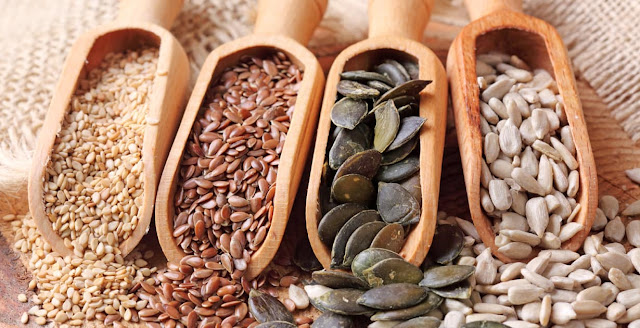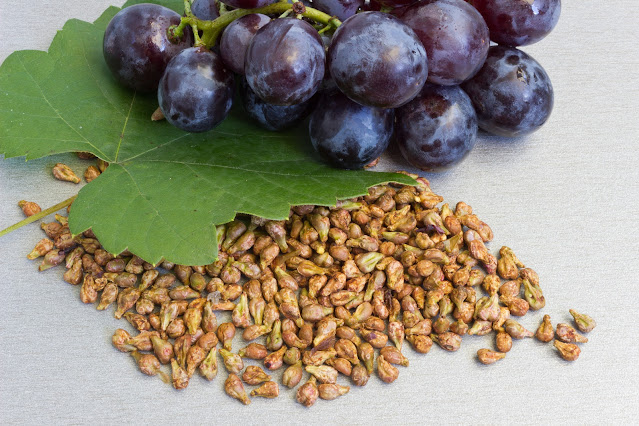
Image Source: Google
Seeds are tiny powerhouses packed with essential nutrients,
healthy fats, and antioxidants that offer numerous benefits for our overall
well-being. In this article, we will explore 12 seeds that can contribute to a
healthy body, radiant skin, and lustrous hair. From chia seeds to flaxseeds,
pumpkin seeds to sesame seeds, these nutritional gems have long been revered
for their incredible health properties. Let's dive into the world of seeds and
discover how they can become a valuable addition to your daily diet.
1.
Chia Seeds:
Chia seeds have gained popularity as a superfood due to their
impressive nutritional profile. These tiny seeds are an excellent source of
fiber, omega-3 fatty acids, and plant-based protein. The high fiber content
helps promote healthy digestion and can aid in weight management by keeping you
feeling full and satisfied. Chia seeds are also packed with antioxidants that
help protect against cell damage and inflammation. When it comes to skin health,
chia seeds can help maintain hydration and promote a youthful appearance due to
their moisturizing properties. Additionally, their omega-3 fatty acids
contribute to healthy hair growth and can improve the overall strength and
shine of your locks.
2.
Flaxseeds:
Flaxseeds are another nutritional powerhouse known for their
numerous health benefits. They are an excellent source of omega-3 fatty acids,
lignans, and fiber. Omega-3 fatty acids are essential for heart health, brain
function, and reducing inflammation in the body. The lignans found in flaxseeds
have antioxidant properties and may help balance hormone levels. The high fiber
content of flaxseeds aids in digestion and can help regulate bowel movements.
When it comes to skincare, flaxseeds' anti-inflammatory properties may help
soothe skin conditions like acne and eczema. Their high omega-3 content also
supports scalp health and can contribute to stronger, healthier hair.
3.
Pumpkin
Seeds:
 |
| Image Source: Google |
Pumpkin seeds, also known as pepitas, are a nutritious and
delicious snack. They are a rich source of magnesium, iron, zinc, and protein.
Magnesium plays a crucial role in maintaining proper muscle function and
promoting relaxation. Iron is essential for oxygen transport in the body, while
zinc supports immune function and wound healing. Pumpkin seeds are also packed
with antioxidants, including vitamin E and carotenoids, which help protect the
body against free radical damage. These antioxidants contribute to healthy skin
by reducing oxidative stress and promoting a youthful complexion. Pumpkin
seeds' high zinc content also supports the production of collagen, a protein
that keeps the skin firm and supple.
4.
Sunflower
Seeds:
Sunflower seeds are not only a tasty snack but also a
nutrient-dense addition to your diet. They are a great source of vitamin E,
which is a powerful antioxidant that helps protect the body's cells from damage
caused by free radicals. Vitamin E also plays a role in maintaining healthy
skin by promoting moisture retention and reducing inflammation. In addition,
sunflower seeds contain phytosterols, which are plant compounds that may help
lower cholesterol levels and support heart health. These seeds are also rich in
magnesium, selenium, and copper, which are important minerals for various
bodily functions.
5.
Sesame
Seeds:
Sesame seeds are small but mighty when it comes to nutrition.
They are a rich source of calcium, iron, magnesium, and zinc. Calcium is
essential for maintaining strong bones and teeth, while iron helps transport
oxygen throughout the body. Magnesium contributes to muscle and nerve function,
and zinc supports immune health and wound healing. Sesame seeds also contain
lignans, which are beneficial plant compounds with antioxidant and
anti-inflammatory properties. These properties may help reduce inflammation in
the body and promote healthy skin. Additionally, sesame oil derived from sesame
seeds is commonly used in skincare products for its moisturizing and nourishing
effects on the skin.
6.
Hemp Seeds:
.jpg) |
| Image Source: Google |
Hemp seeds are gaining popularity as a nutritious superfood.
They are a complete protein source, meaning they provide all nine essential
amino acids that the body needs. Hemp seeds are also rich in omega-3 and
omega-6 fatty acids, which are important for heart health and brain function.
These fatty acids have anti-inflammatory properties and can contribute to a
healthy complexion. Additionally, hemp seeds are a good source of fiber, aiding
in digestion and promoting satiety. They also contain an array of vitamins and
minerals, including vitamin E, magnesium, potassium, and iron.
7.
Quinoa:
While technically a pseudocereal, quinoa is often considered
a seed due to its nutrient composition and culinary uses. Quinoa is an
excellent source of plant-based protein and is rich in essential amino acids,
making it a valuable addition to vegetarian and vegan diets. It is also a good
source of fiber, which supports healthy digestion and can aid in weight
management. Quinoa contains various vitamins and minerals, including magnesium,
phosphorus, and manganese. These nutrients play a role in maintaining bone
health, supporting energy metabolism, and protecting against oxidative stress.
Quinoa's high antioxidant content may also help protect the skin from
environmental damage and contribute to a radiant complexion.
8.
Poppy
Seeds:
Poppy seeds, derived from the opium poppy plant, are small
but packed with nutrients. They are a rich source of dietary fiber, which aids
in digestion and promotes a healthy gut. Poppy seeds are also abundant in
minerals like calcium, iron, and magnesium, which contribute to strong bones
and overall well-being. Additionally, they contain essential fatty acids, such
as omega-3 and omega-6, which are important for brain health and reducing
inflammation in the body. These tiny seeds are known for their nutty flavor and
are often used as a topping for baked goods, salads, or yogurt. However, it's
important to consume them in moderation, as excessive consumption may have
sedative effects due to trace amounts of opium alkaloids.
9.
Pomegranate
Seeds:
Pomegranate seeds are not only delicious but also offer
numerous health benefits. They are a rich source of antioxidants, including
vitamin C and polyphenols, which help protect the body against free radicals
and oxidative stress. Pomegranate seeds are also known for their
anti-inflammatory properties, which can help reduce inflammation in the body
and promote overall health. Additionally, they are a good source of dietary
fiber, which aids in digestion and promotes a healthy gut. Pomegranate seeds
contain vitamins like vitamin K and folate, as well as minerals such as
potassium and copper. Enjoy these juicy and vibrant seeds as a refreshing snack
on their own, or add them to salads, yogurt, or smoothies for an extra burst of
flavor and nutrition.
10. Grape Seeds:
 |
| Image Source: Google |
Grape seeds are often overlooked but can offer notable health
benefits. They are a rich source of antioxidants, particularly
proanthocyanidins, which have been associated with various health-promoting
effects. These antioxidants help protect the body against free radicals and
oxidative stress, which can contribute to aging and certain chronic diseases.
Grape seeds are also known for their potential anti-inflammatory properties and
may support cardiovascular health by promoting healthy blood flow and reducing
the risk of blood clots. Some studies suggest that grape seed extract may even
have a positive impact on skin health, promoting collagen production and
protecting against UV damage. While grape seeds are not typically consumed
whole, they can be found in supplement form or in certain grape seed oils and
extracts.
11. Black Cumin Seeds:
Black cumin seeds, also known as Nigella sativa, have a long
history of medicinal use. They are rich in antioxidants, particularly
thymoquinone, which has been studied for its potential anti-inflammatory and
anticancer properties. Black cumin seeds are also a good source of essential
fatty acids, such as omega-3 and omega-6, which are important for brain health
and reducing inflammation in the body. Additionally, they contain vitamins like
vitamin E and minerals such as iron and calcium. These seeds have a slightly
bitter and peppery flavor and are commonly used as a spice in various cuisines.
They can be sprinkled on salads, added to bread or baked goods, or used as a
seasoning in dishes to enhance both flavor and nutrition.
12. Watermelon Seeds:
Watermelon seeds may often be discarded, but they actually
offer several health benefits. These small seeds are rich in nutrients like
protein, healthy fats, fiber, and various minerals, including magnesium,
potassium, and iron. They also contain antioxidants like vitamin E and certain
phytonutrients, which help protect the body against oxidative damage.
Watermelon seeds are known to support digestive health due to their high fiber
content, aiding in smooth digestion and preventing constipation. They are also
believed to promote cardiovascular health by supporting healthy blood pressure
levels and reducing the risk of heart disease. Additionally, watermelon seeds
are a good source of amino acids, which are the building blocks of proteins and
play a crucial role in numerous bodily functions. Roasted watermelon seeds can
be enjoyed as a crunchy and nutritious snack or used as a topping for salads,
granola, or yogurt.
Conclusion
In conclusion, incorporating a variety of seeds into your diet can contribute
to a healthy body, glowing skin, and lustrous hair. These seeds are packed with
essential nutrients, including protein, healthy fats, fiber, vitamins, and
minerals. They offer a wide range of health benefits, such as promoting heart
health, supporting digestion, boosting immune function, reducing inflammation,
and providing antioxidant protection. Whether you sprinkle them on salads, add
them to smoothies, or enjoy them as a snack, seeds can be a versatile and
nutritious addition to your daily routine. So, explore the world of seeds and
reap the benefits they have to offer for your overall well-being.

.jpg)

